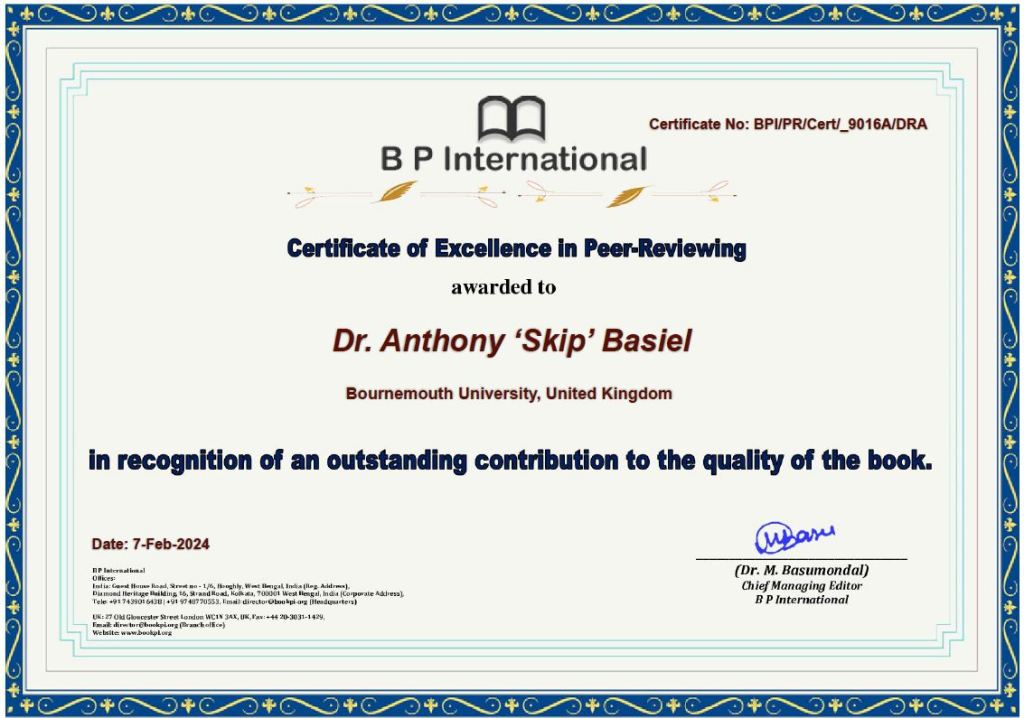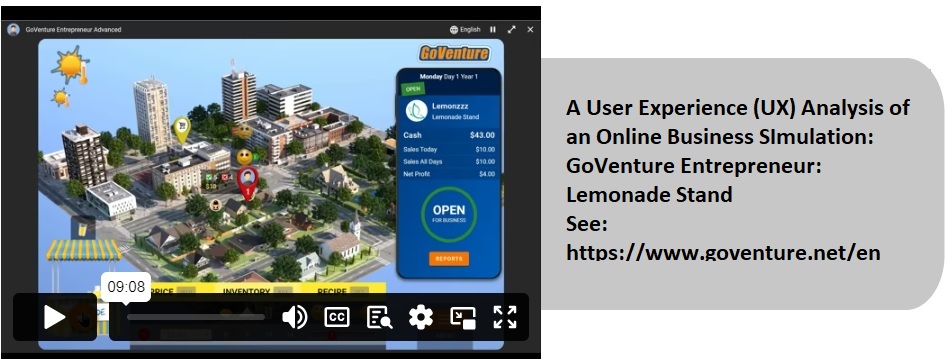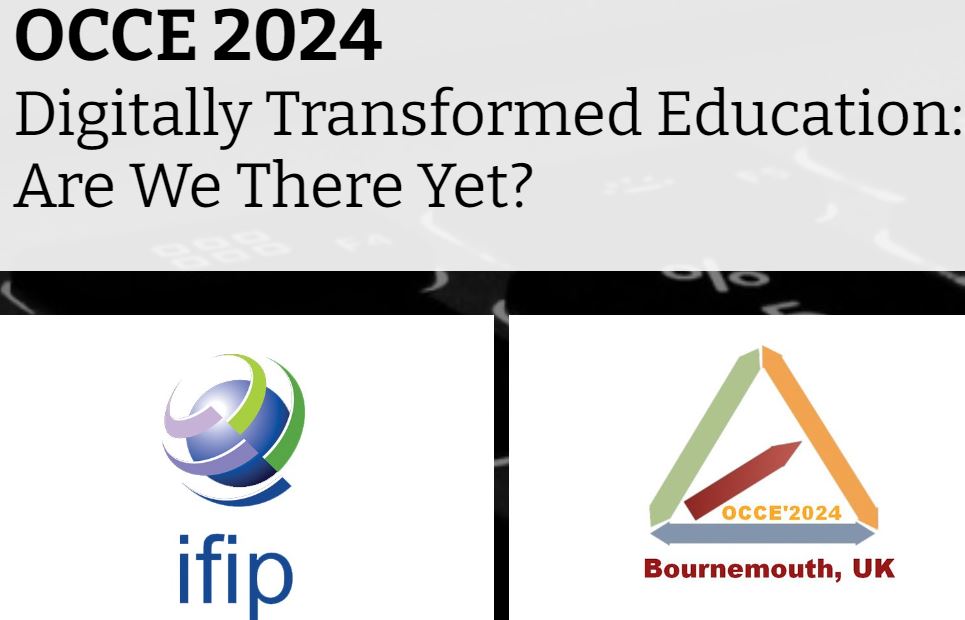Journal Publication Reviewer Recognition 10/02/2024
Posted by abasiel in Uncategorized.add a comment
BP International Publishers at https://www.bookpi.org/
have given me a certificate as one of their reviewers for a book entitled:
Progress in Language, Literature and Education Research. The chapter was called: ‘Designing the simulation learning environment: An active engagement model.’ This article explores models of debriefing for healthcare learning simulations. You may want to see my R&D at https://abasiel.uk/awards/ .
Please email abasiel@gmail.com to arrange a web video chat.

Online Business Learning Simulation: UX Analysis 01/02/2024
Posted by abasiel in Uncategorized.add a comment
The objective of this project is to conduct a user experience (UX) analysis and usability test to measure the impact on the Solent University Business School students playing the GoVenture Entrepreneur online business learning simulation (see https://www.goventure.net/en ). Through a 5-part Sprint UX methodology, the Computing Students research, design and develop high fidelity prototypes from the pain points of the website and simulation. A variety of UX tests are done using both user-centred and task-centred design methods. Please contact Dr Anthony ‘Skip’ Basiel on abasiel@gmail.com for the results of the case study, or if you are interested in the follow-up publication. We are also interested in research collaboration opportunities.

Blended Learning Solutions Podcast & the L&T CHATSHOW 03/01/2024
Posted by abasiel in Uncategorized.add a comment
Happy New Year 2024!
With the new year comes opportunities to try new things. I was invited to be a guest speaker for the L&T CHATSHOW podcast in December ’23. You can now hear my conversation with Roger Saunders, from DMU, at:
https://podcasters.spotify.com/pod/show/landtchatshow/episodes/S4E1—Anthony-Basiel-on-360-learning-e2du3pj
Inspired by this interview event, I have played with making a podcast trailer. Please see below. If anyone is interested in having an online chat about blended learning solutions, email: abasiel@gmail.com
Cheers, Anthony
~~~~~~~~~~~~~~/
https://open.spotify.com/episode/2tnAvMO4XVcvhwzulgeYqO?si=dovTLO8JSoeqF2FFZEHtKg
Bournemouth University Conference, Feb. ’24: OCCE’24 IFIP-tc3 Open Conference Computers Education 23/11/2023
Posted by abasiel in Uncategorized.add a comment
Teams Webinar Link:
http://tinyurl.com/TeamsWebinar-BUconference24

See the video introduction by Dr Anthony ‘Skip’ Basiel: https://youtu.be/RghF6Pg8-a4
This year’s focus will be “Digitally Transformed Education: Are We There Yet?” as a continuation from the IFIP TC3 OCCE 2021 DTEL Tampere, Finland conference theme, “Digital transformation of educational and learning – past, present and future”.
Workshop:
Transforming 360* Immersive Webinar Design to Promote Interactivity: Synthesising Augmented Reality and Artificial Intelligence Agents
Thursday 29 Feb. 2024 – 3pm GMT to 4pm GMT. Location: Bournemouth University Executive Business Centre – Room EB203 (89 Holdenhurst Rd, Bournemouth BH8 8EB)
EVENTBRITE: Register online for free!
https://www.eventbrite.com/e/bournemouth-university-occe-24-conference-workshop-tickets-839949139487?utm-campaign=social&utm-content=attendeeshare&utm-medium=discovery&utm-term=listing&utm-source=cp&aff=ebdsshcopyurl
Webinar to be set with the Klaxoon – our research partners!
Please email abasiel@gmail.com to get on the VIP online audience.
This interactive workshop is composed of two parts:
First, a group of experts critically review the conference theme: “Digitally Transformed Education: Are We There Yet?” Each from their own perspective and technological backgrounds. This round-table discussion uses a blended learning model to take advantage of augmented reality 360* immersive video along with webinar text chat tools and a ‘multi-cam’ innovative set-up. This process is supported by a Local Facilitator using a Socratic discussion circle design to promote engagement with the face-to-face and virtual audience.
The second stage of the workshop involves a new version of the Turing Test, where the audience has opportunities to ask the ‘experts’ questions to determine which of the online speakers is human, and which is an artificial intelligence agent. Participants will vote and discuss their reasoning. This gamification approach to the workshop adds to the engagement of the stakeholders. The results of this case study will be used for academic publications.
See a video of Socrates explaining how we will use a Socratic discussion circle in the workshop at my YouTube channel: https://youtube.com/shorts/OYTQ3LhD1mg?feature=share or click the image below.

Interactive Video: Team Building and Problem Solving 18/11/2023
Posted by abasiel in Uncategorized.1 comment so far
Please see my new interactive video at https://abasiel.uk/elearn/
Work with a partner or group to find a solution: When the man drops the solid block into the water from the boat, will the water level go up – down or stay the same?

[Draft] A Computing User Experience Analysis of a Medical Learning Simulation 18/11/2023
Posted by abasiel in Uncategorized.add a comment
Anthony Basiel anthony.basiel@solent.ac.uk
In collaboration with: Mike Howarth michael.howarth@mhmvr.co.uk, Louise Morrell louise.morrell@solent.ac.uk, Joelle Salje joelle.salje@solent.ac.uk
Abstract
Healthcare learning simulations have grown and matured over the past 40 years on substantive and methodological grounds and looks to be increasing in the future. This small pilot study suggests a well-organised project can assess the usability of a simulation with a limited sample size, conducted over five weeks and with zero budget. This investigation asks, ‘What is the impact on the confidence level of healthcare workers (Nursing students) using learning simulations? Can computing science user experience testing techniques be used to generate evidence to validate the conclusions? A computing science user experience (UX) 5-part Sprint methodology was used to collect evidence from 30 undergraduate Nursing students who used an online 2D medical learning simulation. This cross-discipline project synthesised a variety of technologies and tools to collect data to inform the design of possible improvements to the UX design of the simulation. UX tests were performed to provide evidence on the Nursing students’ experience. Although there was not enough time to validate improvement on the Nurses’ knowledge and skills related to the simulation scenarios, the conclusion is that using the UX modified online medical learning simulation did have a positive impact on the Nurses’ confidence level. Further research is recommended to explore the use of Augmented Reality and 3D Virtual Reality rooms to promote the development of next generation simulation solutions.
Summary Discussion
The research questions: ‘Is there an impact on the confidence level of healthcare workers (Nursing students) using an online learning simulation?’ Can computing science user experience testing techniques be used to generate evidence to validate the conclusions?’ were addressed in this study using both a case study approach and a user experience 5-part sprint methodology to collect data from the stakeholders. Academic and market research provided secondary data to provide a theoretical foundation and commercial context to the use of the 2D OMS platform. A user journey map was generated by each group to follow the path of the Nurses as they did a specific task in the simulation. This process helped to identify specific areas the learners found difficult. High fidelity interactive prototypes were designed, developed and tested. Survey results indicated that the use of the online medical simulations did have a positive influence on the confidence level of the Nursing student participants. Further study is encouraged to measure the impact on knowledge and skill levels of healthcare workers. The use of 360* augmented reality cameras for debriefing circles after learning simulations have been done is another area for research and development. Finally, learning simulations are not confined to 2D screens or virtual reality headsets. 3D immersive rooms have opened learning to provide a new level of learning simulations. Research into the technology and pedagogy provided in this study sets a path to educating our next generation.
See the full draft paper at https://drive.google.com/file/d/1mv2bXFLG1hLfeopmt-dImOI_NdzgIUJr/view?usp=sharing
Invitation to e-Learning Webinar 25 Oct. ’23 at 11:20am BST! 21/10/2023
Posted by abasiel in Uncategorized.add a comment
Hello Colleagues
I hope this conference presentation invitation finds you well.
You are invited to join me on Teams or in person at Southampton Solent University, JM412 for my talk on a project done with the SU Nursing and Computing Science school where we used UX analysis to review an online learning simulation. Wednesday 25 Oct. 11:20 – 11:40BST. You can see details at https://tinyurl.com/JapanConference23
We will be using a 360* AR camera to webcast to Japan but we also want to include a UK face-to-face and Teams audience as well. Please join us if possible. We will also record the event.
If you have any questions, or would like to collaborate on future research, please do contact me. More research can be found at https://abasiel.uk
Yours
Anthony

Bournemouth University Visiting Fellow 19/10/2023
Posted by abasiel in Uncategorized.1 comment so far
Good news. I am now a Visiting Fellow for the Computing Science School at Bournemouth University. I’m looking forward to research collaboration with anyone interested in blended learning solutions and creative webinar design. Please see my website at https://abasiel.uk
for examples of my projects.
I am currently teaching a MSc Research Methods module for Healthcare. I will be doing a web video presentation of my research at the World Nursing and Healthcare Conference in Japan. Please see https://youtu.be/CNtHOiTz4xU or the YouTube tab on this website.
Please email abasiel@gmail.com if you would like to collaborate. Cheers, Anthony
World Nursing and Healthcare Summit: Japan ’23 07/10/2023
Posted by abasiel in Uncategorized.add a comment
I have had my research abstract accepted for this conference. See https://scholarsconferences.com/nursing-healthcare/
The presentation is about a project done in collaboration between the Computing School and the Nursing School. We had 30 Nursing Students use an online medical simulation via Teams screen share. The MSc Computing User Experience students formed 3 groups to identify how the virtual learning scenarios and interface designs could be improved. I will be adding a video below to share the results.
See my web video presentation: https://youtu.be/v49lkIx_sEE

Global Rich Pictures: collaborative mind maps 16/08/2023
Posted by abasiel in Uncategorized.add a comment
This blog provides a set of tools to help any research project to create a mind map or overview of all the elements, components, actors, tech, human and capital resources that can impact on the outcomes or deliverables. This meta-view or gestalt perspective sees groups and sub-groups form in patterns. Peter Checkland (1999) devised the Soft Systems Methodology often used in Computing Science or Systems Analysis investigations. He starts a project with a brainstorming session which kicks off the stakeholders journey to promote communication and form a common language. Use the PowerPoint toolkit below along with the supporting video. If you would like to collaborate by using these resources, please do contact Dr Anthony ‘Skip’ Basiel by email abasiel@gmail.com We can arrange a web video meeting to see what research innovations can grow.
> The PowerPoint Toolkit: https://docs.google.com/presentation/d/1smJNB0zmelQ4lzIyDpXJNwy04lO21-MM/edit?usp=sharing&ouid=115658292435481901964&rtpof=true&sd=true
> The YouTube Video Induction:
https://youtu.be/Ret_xX2BQis